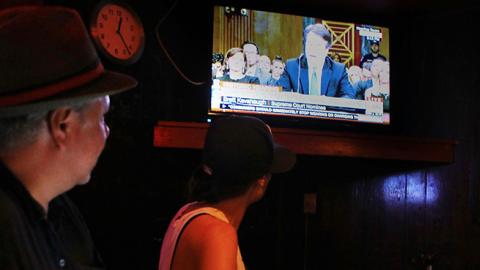Populism is the “ugly brother” of a beautiful girl named “democracy.”
– Werner J. Patzelt, Dresden Technical University
p(firstLetter). At the time of this writing, Americans have just spent two weeks watching the principles, institutions, and social norms that are supposed to hold our country together being trashed by the very people we expect to uphold them. And apart from the tiny number of us who were physically present for the Senate confirmation hearings for Judge (now Justice) Brett Kavanaugh, we watched the entire sordid spectacle through a medium, commercial television, whose overriding priority is to maximize audience size in order to maximize advertising revenue.
To be sure, many Americans no longer watch television on a TV set but rather on a laptop, tablet, or smartphone. We also read voraciously on those same digital devices. But when it comes to a mega-spectacle like the Kavanaugh hearings, our devices, and the print media they deliver to us, serve mainly as magnifiers, multipliers, and amplifiers of the reality show unfolding on—and being shaped by—commercial television. As reported by Reuters on September 28, the Nielsen rating for the combined coverage of the hearings by the six major broadcast and cable networks came to 20.4 million viewers. This may not sound like a lot, but as Reuters continues, the Nielsen count “does not include millions more who streamed the event on phones or computers or crowds that watched in bars and other public places.”
The Kavanaugh spectacle was hardly the first political drama to be televised to a mass audience, but it was certainly the most shrill, vulgar, and shameless. And the queasy feeling it left in our stomachs has a lot to do with the expectation that the shrillness, vulgarity, and shamelessness will only get worse—because it is in the self-interest of our bottom-feeding, bottom-line-obsessed media to let it get worse. Leslie Moonves, the former CEO and president of CBS, spoke candidly back in February 2016, when he crowed to a group of investors that Donald Trump’s campaign for President “may not be good for America, but it’s damn good for CBS. . . . The money’s rolling in!” Personally, I took no pleasure in watching Mr. Moonves get caught in the #MeToo crosshairs and suffer the distinctly un-American fate of being presumed guilty until proven innocent. But I wouldn’t mind seeing him, and his peers, held to account for the media’s role in turning the presidential nomination process, not to mention the presidency, into a grotesque form of entertainment that has nothing to do with responsible political reporting.
It might be objected that when it comes to political reporting, “responsible” means “boring.” I do not deny this. Since time immemorial, the hard work of putting together accurate, fair, comprehensive, and proportionate accounts of the day-to-day workings of representative government has not exactly caused the money to roll in. In the pre-digital age, America’s privately owned media supported the news side of their business with revenue from the more profitable non-news side. These arrangements worked so well for so long, it is easy to forget that the government also played a role. In the case of newspapers, which typically cross-funded their newsrooms with advertising money earned chiefly by the sports, gossip, crime, and fashion pages, the government’s role consisted mainly in upholding press freedom. In the case of the broadcast networks, which sustained their relatively small news divisions with earnings from their much larger entertainment divisions, the government’s role was more tangible: regulation.
Starting in 1934, every radio and TV station in the country had to apply for a license from the Federal Communications Commission, and included in the application process was a requirement to submit evidence that the station was providing enough news to “serve community needs.” Broadcasters also had to abide by the Fairness Doctrine, which required coverage of controversial public affairs in a way that included “contrasting views.” This setup lasted till the 1980s, when the licensing requirements were drastically reduced, and the Fairness Doctrine repealed, by the FCC under President Reagan.
Part of the unspoken rationale for these reforms was the perceived liberal bias of the mainstream media, and there’s no denying that the changes proved liberating for conservatives. In 1988, the year Rush Limbaugh took to the airwaves, the Wall Street Journal ran an editorial comparing the Fairness Doctrine to the Berlin Wall, praising President Reagan for tearing it down, and calling Mr. Limbaugh “the first man to proclaim himself liberated from the East Germany of liberal media domination.”
Today we are all liberated. But like some of the cultural liberties won by the Left, the Right’s freedom to flood the public airwaves with one-sided political rhetoric has proved a mixed blessing. Indeed, while there is still plenty of one-sided political rhetoric out there, we have now reached a place where political rhetoric is beside the point, and we are floundering in a tsunami of populist culture, which unlike popular culture is dangerously entangled with the actual wielding of government power.
p(firstLetter). That buzzing sound you hear is not a drone, it is the word “populist.” Where did this buzzword come from? What does it mean? How does it differ from the pleasanter-sounding “popular”? I ask because, as a writer, editor, and teacher, I am fascinated by the connotations of words—and also because, in all my years of appreciating and criticizing American popular culture, it never occurred to me to call it “populist.” Until now.
The root of both “popular” and “populist” is, of course, populus, Latin for “people.” In ancient Rome populus was used in two different ways: 1) to refer to all the inhabitants of a city, province, or territory; and 2) to refer to the common people (plebeians), as opposed to the nobility (patricians). The resulting ambiguity—the “people” as everybody or, depending on the context, not quite everybody—has persisted over the centuries, no doubt because politicians found it very useful.
In the 1890s the plot thickened with the coining of “populism” to label a protest movement arising in the Southern and Western United States against the plutocratic machinations of banks, monopolistic railroads, and corruption at all levels of government. American populism had its flaws, notably the racism that surfaced after the Southern leader Tom Watson quit trying to build a black-white coalition. But the grievances it raised were real, and despite the electoral failure of the Populist Party, the movement itself succeeded in forcing some crucial issues onto the national agenda.
At the height of its influence, American populism was disdained by the Eastern establishment as an attempt by ignorant, backward hicks to thwart progress. In the 1950s it was condemned as form of proto-fascism by several prominent historians, notably Richard Hofstadter. Twenty years later, a new generation of historians, including Christopher Lasch, took a revisionist view, arguing that American populism was a legitimate political movement of rational citizens whose interests and concerns were being neglected by a political class that was corrupt, arrogant, and out of touch.
This revisionist view is echoed by Werner J. Patzelt, a professor of political science at Dresden Technical University and one of the few European intellectuals willing to admit that “the established political-media class often refer to people as ‘populists’ who frustrate them due to their style of behavior, or because of their political positions.” In a recent essay, Dr. Patzelt interprets the populist surge in Europe as a “warning signal” that a dangerous “gap of representation” has opened between “a significant part of the population” and “their elected politicians.” Describing populism as “the ‘ugly brother’ of a beautiful girl named ‘democracy,’” he lists its four key elements:
# Demagogic Simplification. When a dumbed-down version of reality is used not to educate people but to manipulate them.1
# Selfish Political Entrepreneurship. When elected officials seek mainly to enhance their own power and partake of its spoils.
# Anti-Representative Confrontation of “Below” and “Above.” When politicians display seeming contempt for voters, and voters come to reject not just particular officeholders but the basic principles of representative democracy.
# Assertion of a Clear and Uniform “Will of the People.” When one party or leader persuades one part of the population that they are the only part that counts.2
If this sounds familiar, perhaps it’s because we’ve been watching it on TV for the past two-and-a-half years. It is now something of a cliché to describe the Trump Administration as a reality show, but the topic bears revisiting, because there are two kinds of reality show, and the difference between them bears a marked resemblance to the difference between democracy and populism.
The first type of reality show is the talent-based competition, whether in singing, dancing, cooking, or (in Muslim-majority countries) reciting poetry. These shows, which do well in every media market, are characterized by certain practices that resonate with democratic values. For example, they begin with open auditions, a practice that reflects the ideal of equal opportunity. The winners in each round are selected by a “mixed regime” of popular voting by viewers and a panel of experienced judges. The performances respect norms of propriety and decorum, drawing a connection between public morality and the integrity of the contest. And in the final round the losers are, if anything, more gracious than the winners. In short, this type of reality show focuses on talent, hard work, and achievement, fairly judged and rewarded.
The same cannot be said of the second type of reality show, which is based not on talent but on the willingness of participants to be degraded and humiliated. These shows are characterized by practices that jibe all too well with the uglier tendencies of populism. For example, they do not start with open auditions but with an opaque and manipulative recruitment process. The winners of each round are voted for by viewers for reasons that have little to do with talent, much less propriety or decorum. The competition is often unfair, because the producers unapologetically change the rules. And the final round typically involves a display of cruelty and arbitrary power exercised for their own sake.
But you needn’t take my word for it. Allow me to share with you this anonymous online review by a disillusioned fan of one such degrading reality show:
For the first couple of seasons, I thought [Program X] was engaging and exciting. . . .But season 6 is a big joke. . . .It has absolutely nothing to do with business … The tasks are, at most, boring and mostly a showcase for the companies who are dumb enough to pay [the network] for the publicity. . . .The main focus is mostly in the boardroom where the contestants are expected to do everything to stay on the show (that means lying, trash-talking, backstabbing, etc.). This is entertainment at its low point. . . .In earlier seasons at least some of the contestants had a bit of integrity, now it seems they would kill their own mother. . . .It also seems like ‘the host’s] massive ego becomes bigger and bigger. . . .To be honest, I can’t see why anyone with common sense would want to work for him. . . .He just likes to trash people.
Surely you have guessed that the reality show in question is The Apprentice, which ran for fourteen seasons on NBC under the same host: Donald J. Trump.
Amid the heated debates over the ratification of the U.S. Constitution, James Madison wrote: “Were the pictures which have been drawn by the political jealousy of some among us faithful likenesses of the human character, the inference would be, that there is not sufficient virtue among men for self-government; and that nothing less than the chains of despotism can restrain them from destroying and devouring one another.” Words to ponder the next time we tune in.















